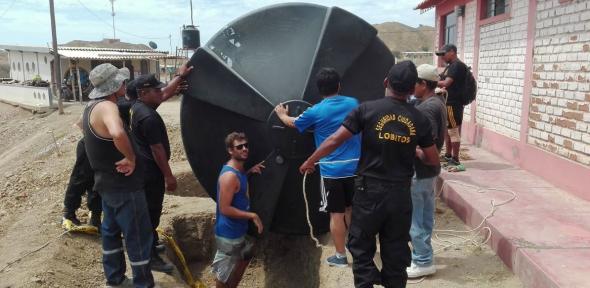
Published on 12 June 2019
The 2019 ICE Environmental Engineering and Science Prize has been awarded to a paper by lead authors from the Laing O’Rourke Centre for Construction Engineering and Technology and the CDT in Future Infrastructure and the Built Environment.
Each year, ICE Publishing acknowledges the best work published in their journals – awarding work judged to be of exceptional quality and benefit to the civil engineering, construction and materials science community.
This year the Environmental Engineering and Science Prize has been awarded to a paper on ‘Sustainable decentralised wastewater treatment schemes in the context of Lobitos, Peru’, the first authors of which are University of Cambridge PhD students, Sivasakthy Selvakumaran, in the Laing O'Rourke Centre for Construction Engineering and Technology, and Christiana Smyrilli, in the EPSRC CDT in Future Infrastructure and the Built Environment.

Christiana Smyrilli (left) and Sivasakthy Selvakumaran (right)
Congratulations to everyone who contributed to this award-winning paper.
Smyrilli C, Selvakumaran S, Alderson M et al. (2018) Sustainable decentralised wastewater treatment schemes in the context of Lobitos, Peru. Journal of Environmental Engineering and Science 13(1): 8–16
‘The implementation of decentralised wastewater treatment systems, such as biodigesters, septic tanks and treatment ponds, provides opportunities for rural or remote communities to be self-reliant and avoid infrastructural connections to faraway urban areas. However, the effectiveness, sustainability and success of such systems is heavily tied to understanding the overall context (geographical, social, cultural, political and economic) in which they are installed, as well as the ease of their operation and maintenance in the long term. Shortcomings to addressing these aspects can lead to the failure of a project. Using the town of Lobitos, located in the Piura District on the northern coast of Peru, as the case study for this research, this paper is discussing and analysing the use of biodigesters as a more sustainable solution over larger municipal wastewater systems in the context of Lobitos. It explains reasons, such as community engagement, behind past failures of such systems and outlines lessons learned from a practitioner’s perspective. It concludes that addressing the local context as well as considering its impact throughout the project cycle, such as installation and future operation and maintenance, helps to ensure continued delivery of safe and sustainable wastewater treatment.’
>> Read more in the open-access paper, here.
The text in this work is licensed under a Creative Commons Attribution 4.0 International License.
